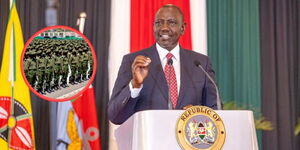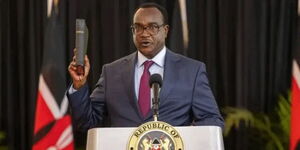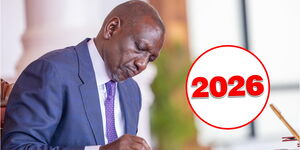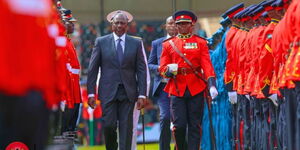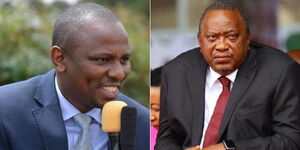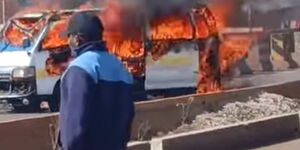Mbeere North Member of Parliament Ruku Geoffrey Kiringa on Tuesday, May 2, revealed details of a Bill which he was sponsoring in the National Assembly, that seeks to re-define how demonstrations will be carried out in Kenya.
Ruku stated that the Bill which will be tabled in the house for debate will among other things enlist types of protests, nature and how to carry out protests.
The Mbeere North MP wants police to be given more powers in order to deal with those flouting Public Order Act, especially, the leaders behind such demonstrations.
"This morning I am forwarding the Speaker of the National Assembly a Maandamano Bill. A Bill which if enacted, will regulate how demonstrations are carried in this country," Ruku stated.
He explained that Kenya would have to adopt mechanisms which are employed in other developed nations in a manner that creates harmony and peace in the country.
"In most developed countries people hold demonstrations by hooting in traffic, others just whistle, those are the kind of peaceful demonstrations we are talking about.
"From what we have seen in the past, demonstrations in this country are always not peaceful, they are chaotic with serious elements of violence in the demonstrations," Ruku stated.
The Maandamano Bill will ensure that protests remain an effective way for individuals or groups to raise awareness about important issues and advocate for change without violence that leads to death and wanton destruction of property.
Ruku stated that it is important for disgruntled individuals to protest in a safe and responsible manner.
"Before engaging in a protest, it is important to understand your legal rights and the laws governing protests in your area. This includes knowing the rules around permits, time limits, and peaceful assembly.
"The protesters should also organise with others who share a common cause and have a clear goal in mind. Plan the route of the protest and the messages you want to convey. Ensure that everyone participating in the protest is aware of the plan," Ruku described the Bill.
The Member of Parliament noted that violence, vandalism, or other destructive behaviors can undermine the message of protest and harm innocent people. He urged protesters to always maintain a peaceful demeanor and avoid confrontations with counter-protesters or law enforcement.
"Respect the rights of others who may not share your views and avoid disrupting their daily lives. Use respectful language and avoid personal attacks or insults.
"Protests can be unpredictable and potentially dangerous, so it's important to take precautions to protect yourself and others. Wear appropriate clothing and footwear, carry a charged mobile phone, and bring any necessary medications or first-aid supplies," Ruku noted.
The Law will also allow members of the public to record or take photos of the protest to document the event and ensure that any misconduct or violence is captured. The materials will be shared with authorities and news outlets to hold those responsible accountable.
It was observed that by following these guidelines, protesters can demonstrate their message in a safe and peaceful manner while still making their voices heard.
On March 26, Interior Cabinet Secretary Kithure Kindiki proposed a change in Article 37 of the Constitution in order to introduce 10 changes to the law.
"The government shall introduce in Parliament subsidiary legislation in the form of Regulations pursuant to the Public Order Act and the Statutory Instruments Act to provide for the legal circumscription of assemblies, demonstrations, pickets and petitions," he stated.
In the new Law, Kindiki sought to introduce new procedure for notification, duties of security agencies to protect the rights of those participating in the demonstrations, demarcation of assembly zones and duty of public agencies and institutions to set aside a zone for persons who wish to present petitions to public authorities.
Kenya has a long history of political and social protests, with some of the most notable occurring during the 2007-2008 post-election violence that claimed the lives of over 1,000 people.
In 2017, there were widespread protests following the disputed presidential election, with opposition supporters taking to the streets to demand a new vote. In 2018, there were also protests against a proposed tax on fuel, which was eventually scrapped.


